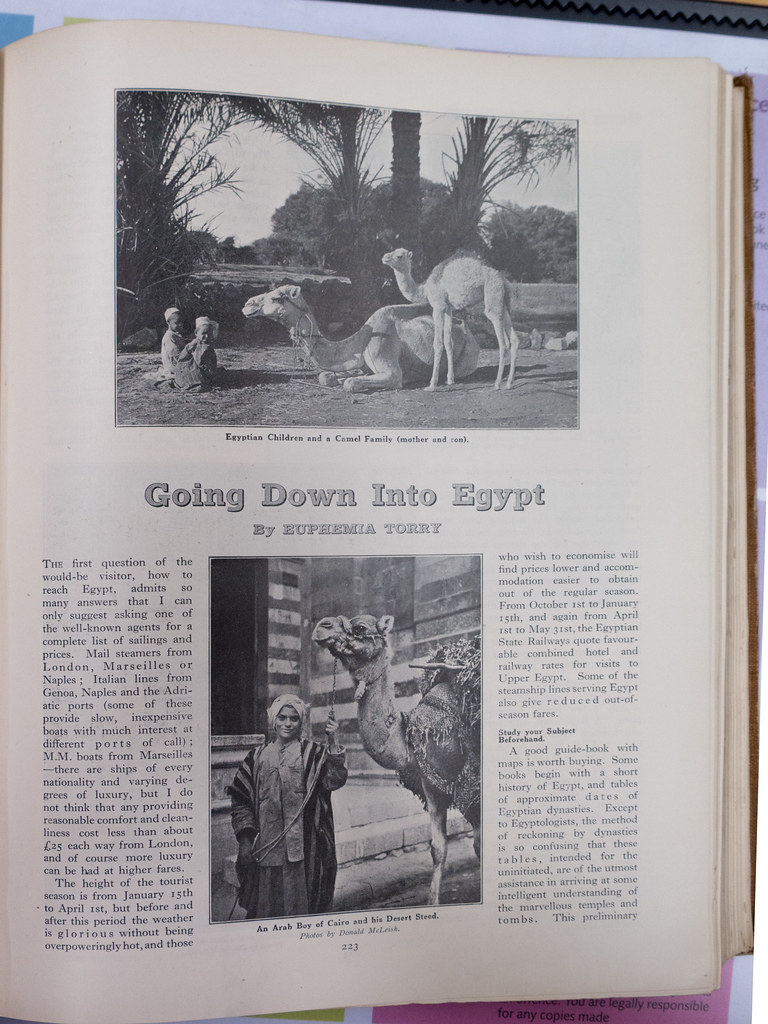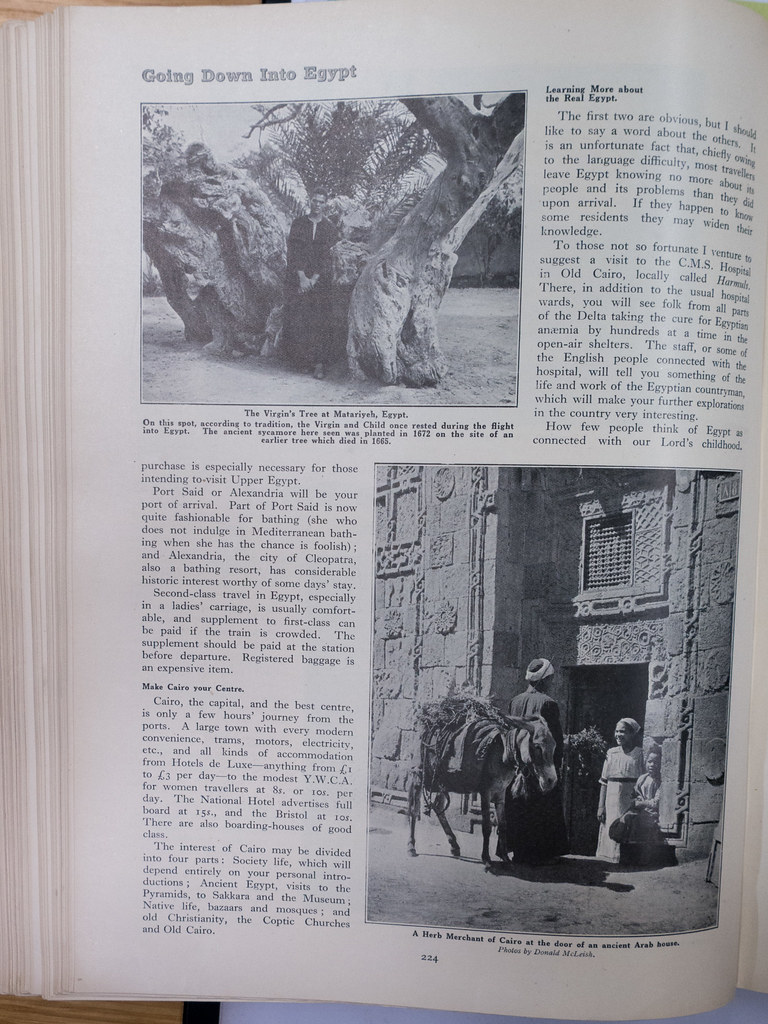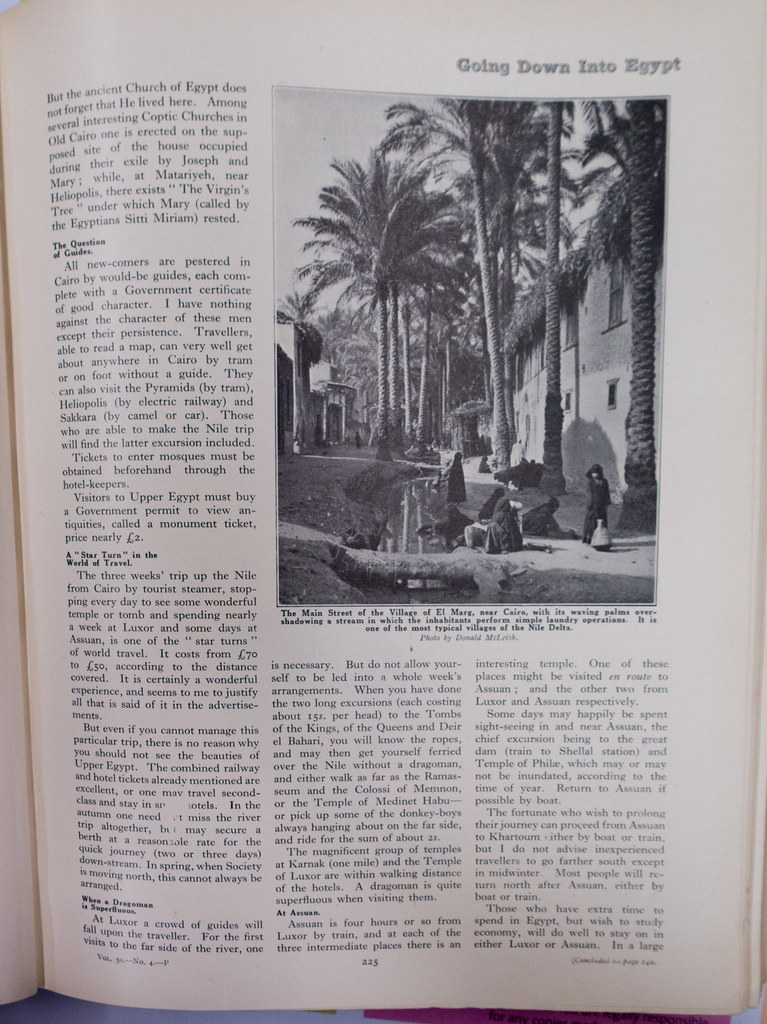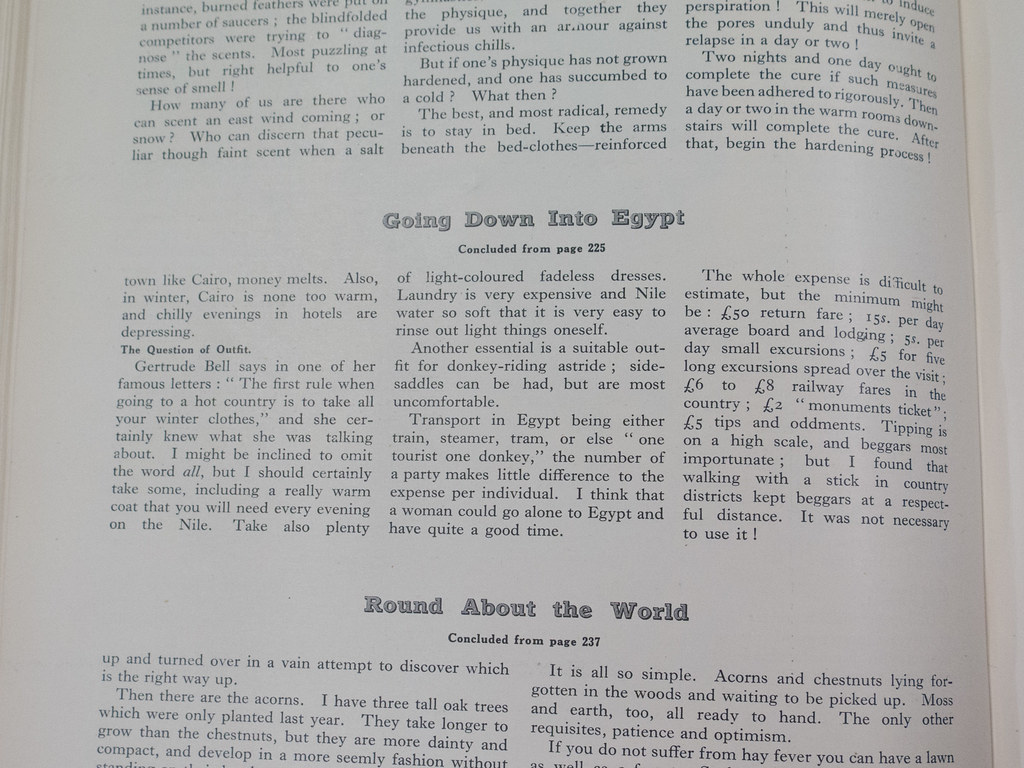It has been a while but since it is stay inside tonight for #exTCDebbie, I thought I might put up another one of Effie’s articles. Reading this really makes me want to go and visit Egypt!
~~~
Going Down Into Egypt
By Euphemia Tory
Published in Volume 50 (1928-1929) of the Girl’s Own Annual, pages 223-225
THE first question of the would-be visitor, how to reach Egypt, admits so many answers that I can only suggest asking one of the well-known agents for a complete list of sailings and prices. Mail steamers from London, Marseilles or Naples; Italian lines from Genoa, Naples and the Adriatic ports (some of these provide slow, inexpensive boats with much interest at different ports of call) ; M.M. boats from Marseilles , there are ships of every nationality and varying degrees of luxury, but I do not think that any providing reasonable comfort and cleanliness cost less than about £25 each way from London, and of course more luxury can be had at higher fares.
The height of the tourist season is from January 15th to April 1st, but before and after this period the weather is glorious without being overpoweringly hot, and those who wish to economise will find prices lower and accommodation easier to obtain out of the regular season.
From October 1st to January 15th, and again from April 1st to May 31st, the Egyptian State Railways quote favourable combined hotel and railway rates for visits to steamship lines serving Egypt also give reduced out-of- season fares.
Study your Subject Beforehand.
A good guide-book with maps is worth buying. Some books begin with a short history of Egypt, and tables of approximate dates of Egyptian dynasties. Except to Egyptologists, the method of reckoning by dynasties is so confusing that these intended for the tables, uninitiated, are of the utmost assistance in arriving at some intelligent understanding of the marvellous temples and tombs. This preliminary purchase is especially necessary for those intending to visit Upper Egypt.
Port Said or Alexandria will be your port of arrival. Part of Port Said is now quite fashionable for bathing (she who does not indulge in Mediterranean bathing when she has the chance is foolish) ; and Alexandria, the city of Cleopatra, also a bathing resort, has considerable historic interest worthy of some days’ stay.
Second-class travel in Egypt, especially in a ladies’ carriage, is usually comfortable, and supplement to first-class can be paid if the train is crowded. The supplement should be paid at the station before departure. Registered baggage is an expensive item.
Make Cairo your Centre.
Cairo, the capital, and the best centre, is only a few hours’ journey from the ports. A large town with every modern convenience, trams, motors, electricity, and all kinds of accommodation etc., from Hotels de Luxe anything from £1 to £3 per day to the modest Y. W.C.A. for women travellers at 8s. or 10s. per day. The National Hotel advertises full board at 15s., and the Bristol at 10s. There are also boarding-houses of good class.
The interest of Cairo may be divided into four parts: Society life, which will depend entirely on your personal introductions; Ancient Egypt, visits to the Pyramids, to Sakkara and the Museum; Native life, bazaars and mosques and old Christianity, the Coptic Churches and Old Cairo.
Learning More about The Real Egypt.
The first two are obvious, but I should like to say a word about the others. It is an unfortunate fact that, chiefly owing to the language difficulty, most travellers leave Egypt knowing no more about people and its problems than they did If they happen to know upon arrival some residents they may widen their knowledge. To those not so fortunate I venture to suggest a visit to the C.M.S. Hospital in Old Cairo, locally called Harmuls. There, in addition to the usual hospital wards, you will see folk from all parts of the Delta taking the cure for Egyptian anæmia by hundreds at a time in the open-air shelters. The staff, or some of the English people connected with the hospital, will tell you something of the life and work of the Egyptian countryman, which will make your further explorations in the country very interesting. How few people think of Egypt as connected with our Lord’s childhood. But the ancient Church of Egypt does not forget that he lived here. Among several interesting Coptic Churches in Old Cairo one is erected on the supposed site of the house occupied during their exile by Joseph and Mary at Matariyeh, near Heliopolis, there exists “The Virgin’s Tree” under which Mary (called by the Egyptians Sitti Miriam) rested.
The Question of Guides.
All new-comers are pestered in Cairo by would-be guides, each complete with a Government certificate. I have nothing of good character against the character of these men except their persistence. Travellers, able to read a map, can very well get about anywhere in Cairo by tram or on foot without a guide. They can also visit the Pyramids (by tram), Ileliopolis (by electric railway) and Sakkara (by camel or car). Those who are able to make the Nile trip will find the latter excursion included. Tickets to enter mosques must be obtained beforehand through the hotel-keepers. Visitors to Upper Egypt must buy a Government permit to view antiquities, called a monument ticket, price nearly £2.
A Star Turn in the World of Travel.
The three weeks’ trip up the Nile from Cairo by tourist steamer, stopping every day to see some wonderful temple or tomb and spending nearly a week at Luxor and some days at Assuan, is one of the ” star turns ” of world travel. It costs from £70 to £50, according to the distance covered. It is certainly a wonderful experience, and seems to me to justify all that is said of it in the advertisements.
But even if you cannot manage this particular trip, there is no reason why you should not see the beauties of Upper Egypt. The combined railway and hotel tickets already mentioned are excellent, or one may travel second class and stay in small hotels. In the autumn one need not miss the river trip altogether, but may secure a berth at a reasonable rate for the quick journey (two or three days) down-stream. In spring, when Society is moving north, this cannot always be arranged.
When a Dragoman is Superfluous.
At Luxor a crowd of guides will fall upon the traveller. For the first visits to the far side of the river, one is necessary. But do not allow your-self to be led into a whole week’s arrangements. When you have done the two long excursions (each costing about 15s. per head) to the Tombs of the Kings, of the Queens and Deir el Bahari, you will know the ropes, and may then get yourself ferried over the Nile without a dragoman, and either walk as far as the Ramasseum and the Colossi of Xlemnon, or the Temple of Xledinet Habu or pick up some of the donkey-boys always hanging about on the far side, and ride for the sum of about 2s. The magnificent group of temples at Karnak (one mile) and the Temple of Luxor are within walking distance of the hotels. A dragoman is quite superfluous when visiting them.
At Assuan.
Assuan is four hours or so from Luxor by train, and at each of the three intermediate places there is an interesting temple. One of these places might be visited en route to Assuan; and the other two from Luxor and Assuan respectively. Some days may happily be spent sight-seeing in and near Assuan, the chief excursion being to the great dam (train to Shellal station) and Temple of Philae, which may or may not be inundated, according to the time of year. Return to Assuan it possible by boat.
The fortunate who wish to prolong their journey can proceed from Assuan to Khartoum either by boat or train, but I do not advise inexperienced travellers to go farther south except in midwinter. Most people will return north after Assuan either by boat or train. Those who has. extra time to spend in Egypt, but wish to study economy , will do to stay on in either Luxor or Assuan. In a large town like Cairo, money melts. Also, in winter, Cairo is none too warm, and chilly evenings in hotels are depressing.
The Question of Outfit.
Gertrude Bell says in one of her famous letters : ” The first rule when going to a hot country is to take all your winter clothes,” and she certainly knew what she was talking about. I might be inclined to omit the word all, but I should certainly take some, including a really warm coat that you will need every evening on the Nile. Take also plenty of light-coloured fadeless dresses. Laundry is very expensive and Nile water so soft that it is very easy to rinse out light things oneself. Another essential is a suitable out-fit for donkey-riding astride ; side- saddles can be had, but are most uncomfortable. Transport in Egypt being either train, steamer, tram, or else ” one tourist one donkey,” the number of a party makes little difference to the expense per individual. I think that a woman could go alone to Egypt and have quite a good time.
The whole expense is difficult to estimate, but the minimum might be : £50 return fare ; 15s. per day average board and lodging ; 5s. per day small excursions ; £5 for five long excursions spread over the visit ; to £8 railway fares in the country ; £2 ” monuments ticket ” £5 tips and oddments. Tipping is on a high scale, and beggars most importunate; but I found that walking with a stick in country districts kept beggars at a respectful distance. It was not necessary to use it!
~~~



